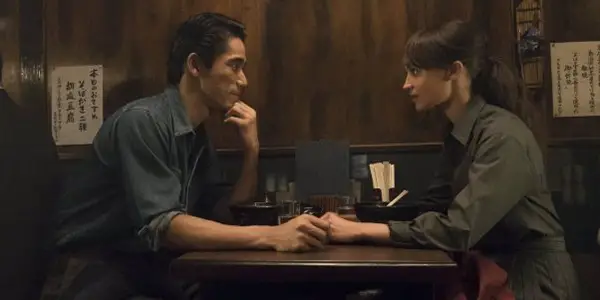EARTHQUAKE BIRD: Psychological Thriller Starts Off Strong But Veers Off Balance

David is a film aficionado from Colchester, Connecticut. He enjoys…
Earthquake Bird, the latest from director Wash Westmoreland, is a film struggling to find its own identity. As a film focusing on foreigners living in Japan in the 1980s, it is an attempt at conveying both a specific time and place, and in addition, our protagonist’s place within it. Yet, the film also delves into a missing person’s case, adds some psychological nuances, and, for good measure, a love triangle as well. Individually, each of these pieces often work well; meshed together, however, it makes for a rather chaotic watch.
1980s Tokyo
Based on a novel by Susanna Jones, Earthquake Bird is about Lucy Fly (Alicia Vikander), a young woman from Sweden who now lives in Tokyo, Japan. Working as a translator for the last several years, she often appears reserved and quiet, as if hesitant to face something in her past. One day, she comes across Teiji Matsuda (Naoki Kobayashi), a photographer who seems just as emotionally distant as Lucy. The two find an immediate attraction to one another, and strike up a relationship.
Enter Lily Bridges (Riley Keough), who is from England and likewise is foreign to Japan. Lucy meets her through a mutual friend and reluctantly takes her under her wing, teaching her the language and customs of the city. Soon, though, Lily takes a liking to Teiji, to the disdain and growing jealousy of Lucy.

If there is one thing to immediately notice about Earthquake Bird, it’s how incredibly detailed and defined its setting is. Taking place in Tokyo, Japan, it also focuses on a foreigner attempting to make a life there, and in addition is set during the late 1980s. Not having an immediate reference to any of those details, I did some reading, and the film does appear mostly accurate to the time and place for which it is set. The one reference I had immediately thought of is, of course, Lost in Translation, but here, Japan is instead seen as an eerily captivating place, the kind you would want to live in while also feeling somewhat out of place within it as well.
The film eases us into this world, setting a tone through its entrancing score by Atticus Ross, Leopold Ross, and Claudia Sarne. Director Wash Westmoreland may be more familiar with character studies and lavish biopics, as he has in the past with films like Still Alice and Colette, but with Earthquake Bird, he shows that he is capable of effectively treading into the thriller genre as well.
Love Triangle
Seeing the events of the film through the eye of Lucy also adds to a feeling of alienation. Lucy herself, played with precise nuance by Alicia Vikander, is emotionally vacant, rarely smiling and seemingly content with drifting through life as one of the only white people in a primarily Japanese city. It’s also noteworthy that Vikander learned Japanese for the film, and much of her dialogue is spoken in the language, lending to the character’s authenticity. It’s only when Lucy first meets Teiji that we begin to see a reaction from her; his mysteriousness is alluring, in a primal yet somehow slightly frightening way as well. Kobayashi, in his international debut, plays Teiji with just the right balance of suave and enigmatic.

When Riley Keough‘s Lily steps in, who is bubbly and carefree, essentially the polar opposite of Lucy, we see Lucy open up even more. Yet it is these two central relationships that lead to the film’s spiraling of events. Unfortunately, it is also here that Earthquake Bird starts to fall apart at the seams. The love triangle not only seems to come out of nowhere, it also detracts from the hypnotic tone that had once been so alluring. Strange choices by the film’s characters soon start to emerge, and by the time Earthquake Bird heads into its final act, it is almost completely unrecognizable from what came before.
Unevenness
What really causes Earthquake Bird to fall apart is the tonal inconsistency of the second half of the film. An example is the hallucinatory aspects that had been prevalent earlier, when certain events and characters drift in and out of focus, and Lucy is uncertain as to what is real and what is simply in her mind. Yet, as the film progresses, these moments either dissipate entirely, or have little effect on its events. An idea of an “earthquake bird” that forms the title is an attempt to make a philosphical statement, but it’s as confused and out of place as the film’s tone.

In addition, the editing of Earthquake Bird suddenly gets very choppy. As opposed to being smooth and unwavering as it was previously, it suddenly cuts from one scene to the next, pushing through days and weeks without much of a transition. Perhaps the best example of this is the film’s final scene, which it flits to without any reaction as to what had preceded it or to how it really fits in with the rest of the plot. A decision to frame the film around a discussion in an interrogation room occasionally works, but overall does not much help matters. The film really needed more tightening up in order to feel like a fully fleshed-out story.
Conclusion: Earthquake Bird
It’s unfortunate that Earthquake Bird falls apart in the way that it does, as a film with this much of a unique premise and setting and populated with talented actors had such potential. As it is, though, it’s likely to be but a blip in the filmography of both its stars and director.
What are your thoughts on Earthquake Bird? Are you a fan of films about foreigners in foreign lands?
Earthquake Bird is now available on Netflix.
Does content like this matter to you?
Become a Member and support film journalism. Unlock access to all of Film Inquiry`s great articles. Join a community of like-minded readers who are passionate about cinema - get access to our private members Network, give back to independent filmmakers, and more.
David is a film aficionado from Colchester, Connecticut. He enjoys writing, reading, analyzing, and of course, watching movies. His favorite genres are westerns, crime dramas, horror, and sci-fis. He also enjoys binge-watching TV shows on Netflix.













